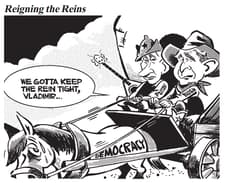What’s wrong if the majority community rules? If Sinhalas don’t rule in Sri Lanka, where else will they rule?

Important Questions on Power-Sharing
In the context of the amendment of Belgium Constitution, comment on the following statement "We are glad that our Indian constitution does not say which minister will come from which community".
Annette studies in a Dutch medium school in the northern region of Belgium. Many French-speaking students in her school want the medium of instruction to be French. Selvi studies in a school in the northern region of Sri Lanka. All the students in her school are Tamil speaking and they want the medium of instruction to be Tamil.
If the parents of Annette and Selvi were to approach respective governments to realise the desire of the child who is more likely to succeed? And why?
Read the given story carefully and answer the question the following question.
“In the city of Beirut, there lived a man called Khalil. His parents came from different communities. His father was an Orthodox Christian and his mother a Sunni Muslim. This was not so uncommon in this modern cosmopolitan city. People from various communities that lived in Lebanon came to live in its capital, Beirut. They lived together, intermingled, yet fought a bitter civil war among themselves. One of Khalil’s uncles was killed in that war.
At the end of this civil war, Lebanon’s leaders came together and agreed to some basic rules for power-sharing among different communities. As per these rules, the country’s President must belong to the Maronite sect of Catholic Christians. The Prime Minister must be from the Sunni Muslim community. The post of Deputy Prime Minister is fixed for the Orthodox Christian sect and that of the Speaker for Shia Muslims. Under this pact, the Christians agreed not to seek French protection and the Muslims agreed not to seek unification with the neighbouring state of Syria. When the Christians and Muslims came to this agreement, they were nearly equal in population. Both sides have continued to respect this agreement though now the Muslims are in a clear majority.
Khalil does not like this system one bit. He is a popular man with political ambition. But under the present system, the top position is out of his reach. He does not practice either his father’s or his mother’s religion and does not wish to be known by either. He cannot understand why Lebanon can’t be like any other ‘normal’ democracy. “Just hold an election, allow everyone to contest and whoever wins maximum votes becomes the president, no matter which community he comes from. Why can’t we do that, like in other democracies of the world?” he asks. His elders, who have seen the bloodshed of the civil war, tell him that the present system is the best guarantee for peace…”
If you had the power to rewrite the rules in Lebanon what would you do? Would you adopt the ‘regular’ rules followed everywhere, as Khalil suggests? Or stick to the old rules? Or do something else?
Recently some new laws were made in Russia giving more powers to its President. During the same time, the US president visited Russia. What according to this cartoon, is the relationship between democracy and concentration of power? Can you think of some other examples to illustrate the point being made here?
Here is an example of power-sharing. Which of the four types of power-sharing do these represent? Who is sharing power with whom?
The Bombay High Court ordered the Maharashtra state government to immediately take action and improve living conditions for the -odd children at seven children’s homes in Mumbai.
Here is an example of power-sharing. Which of the four types of power-sharing do these represent? Who is sharing power with whom?
The government of Ontario state in Canada has agreed to a land claim settlement with the aboriginal community. The minister responsible for Native Affairs announced that the government will work with aboriginal people in a spirit of mutual respect and cooperation.
Here is an example of power-sharing. Which type of power-sharing do these represent? Who is sharing power with whom?
- Russia’s two influential political parties, the Union of Right Forces and the liberal Yabloko movement agreed to unite their organisations into a strong right-wing coalition. They propose to have a common list of candidates in the next parliamentary elections.

